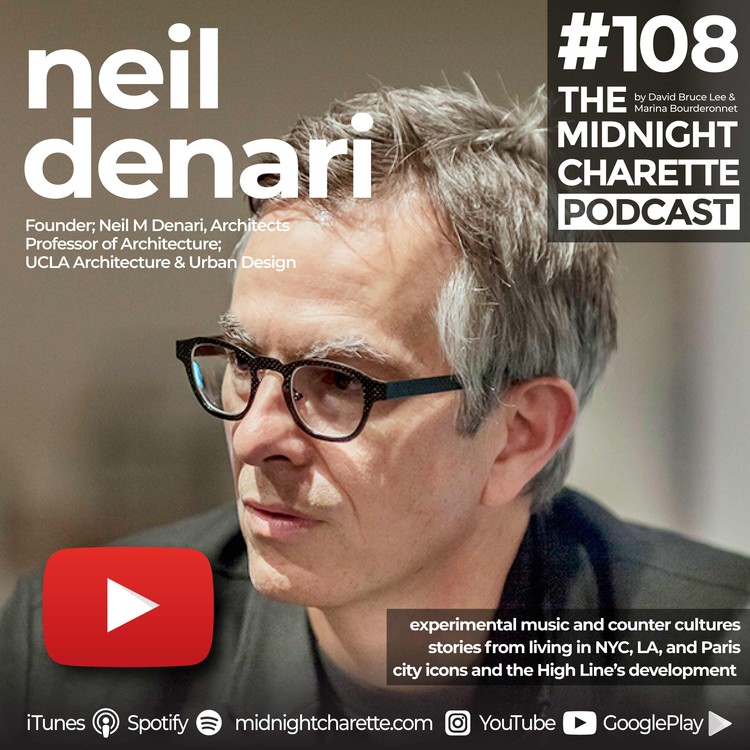
The Midnight Charette is an explicit podcast about design, architecture, and the everyday. Hosted by architectural designers David Lee and Marina Bourderonnet, it features a variety of creative professionals in unscripted and long-format conversations that allow for thoughtful takes and more personal discussions. Honesty and humor are used to cover a wide array of subjects: some episodes provide useful tips for designers, while others are project reviews, interviews, or simply explorations of everyday life and design. The Midnight Charette is available for free on iTunes, YouTube, Spotify, and all other podcast directories.
On this episode of The Midnight Charette podcast, Architect Neil Denari discusses his experimental music and shares his thoughts on urban design, teaching, living in New York City and Paris, the development and evolution of the High Line, and more.

Bio from www.denari.com. Neil Denari is principal of Neil M. Denari Architects / NMDA and a Professor in the Department of Architecture and Urban Design at UCLA. Among his many awards is the 2011 Los Angeles AIA Gold Medal. Denari’s work has been included in many exhibitions, including the traveling solo show “Displaced Buildings in Aperiodic City” which was inaugurated in 2017 by the T-Space Gallery in Rhinebeck, New York. His work is permanently held by eight major museums around the world. Denari has been a Visiting Professor at Harvard, Princeton, Columbia, Penn, and Rice among other schools. He is the author of Interrupted Projections (1996), Gyroscopic Horizons (1999), and MASS X (2018).
Listen to the interview on iTunes or Spotify.
HIGHLIGHTS & QUOTES (timestamps for video player)
(00:0) Teaching design
- (15:08) “Where we treat the idea of research versus inspiration . . . that is a fault line that is new now. Where with so much access, students are looking for inspiration, where before with less access, one treated it more like research. Access and speed produce an idea that the cursory search is limited to inspiration, which is a term that's too overused as opposed to ‘research’”
(22:44) Denari’s approach to architecture
- “My education really began after school. I got an apartment in New York and I sat down at my drawing board and I drew very simple things to try to start from scratch. I read philosophy of science and I tried to understand what did it mean to contend with the idea of uncertainty or the world of the quantum, and what would that mean in terms of architecture. Sort of heady, quasi pretentious ideas, but it was helping me think about how could I apply thinking to concepts and then turn it into to form.”
- (25:05) “I still work quite intuitively, but I find ways to discipline the intuition much earlier in the process. [ . . . ] I still think it's arbitrary until I decide that it's not arbitrary. But it becomes not arbitrary through a persuasiveness of rigor and precision. That's a hallmark of what I do, what we do as an office. I think even though somebody could dismiss it, at the same time, my ambition is to be hardcore and very persuasive.”
(26:20) Moralizing architecture and urban design
(38:57) The urban character of Los Angeles
(46:00) Denari’s discusses his experimental music.
- “For the first, I want to say 20 years, it was guitar based experimentalism that I was into in New York, which was really the time when I was able to truly experience a kind of a radical approach to music. [ . . . ] It’s a form of research. I’m focused completely on extrapolating from music and making it and seeing how I can something with it. It's as serious the hobby is one could have and still be true to their calling. In my case as an architect and a professor.”
(50:37) Subcultural interests and living in New York City
- (53:25) “My first five years or so here [in Los Angeles], I spent a lot of time going into the noire world of LA as much as I could to, to keep my connection to that side of culture. I don't say that I've got weird interests so much as a certain type of set of subcultural interests in art and music and so forth that I don't actually share with most people, especially in my profession.”
- (54:21) “Some of the performances I saw in New York [ . . . ] There was some deprived things going on, but it was performance art and it was an aesthetic project of a certain type of realm and I was super interested in that. That's why I was in New York, to discover those things. I think they've given me a lot of perspective on my own work.“
(1:06:13) Denari discusses living in Paris
(01:27:35) The High Line; Chelsea, Manhattan; and HL23
- (01:36:37) “Take my project or Zaha's project. It’s super exotic and you're going, “I've never seen anything like that. What is it?” It's a true spectacle [ . . . ] There’s an entertainment factor to that, which is also still based on what architecture does in a city. If you go to Paris, Pompidou is an icon; it's an attraction. And in the case of the high line, because you're moving along it, then these buildings become like a diorama in a natural history museum.”
(01:39:42) West Coast Architects in New York City
- “In a way, New York didn't want anything great for a while and it kind of took this unmitigated challenge to the city's identity, losing the twin towers, and then the defiance came. [ . . . ] New York opened its doors up to west coast architects because Frank Gehry, Thom Mayne and I were the first three architects from Los Angeles to do freestanding buildings in New York.”
This podcast episode is available on The Midnight Charette's website, YouTube, iTunes, Spotify, and all other podcast apps.


